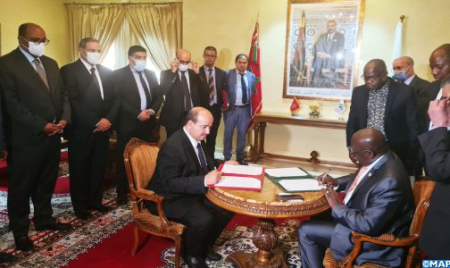Laayoune Declaration Commends Morocco’s Important Role in Major Regional Issues
The Laayoune Declaration, which was signed on the occasion of the visit of the Speaker of the Parliament of the Economic Community of West African States (ECOWAS) to the city of Laayoune, commends the important role played by the Kingdom of Morocco under the leadership of HM King Mohammed VI, in major regional issues. The document, which was signed Wednesday by the Speaker of the House of Advisors, Naama Mayara, and the Speaker of the ECOWAS parliament, Sidie Mohamed Tunis, praises the important role of Morocco in managing challenges related to migration, enhancing food, health, and energy security, and achieving sustainable development. The declaration also commends the important role played by the Economic Community of West African States to reinforce de process of the regional and continental integration and development, stressing the importance of south-south cooperation as a key factor in facing the challenges and stakes posed at the international and regional levels, and as a mechanism to launch a structural transformation of the economies of the region’s countries, and lay the foundations for strong and sustainable growth. The Laayoune Declaration emphasizes the importance of strengthening cooperation between the House of Advisors and the Economic Community of West African States Parliament, and investing all available opportunities and possibilities to consolidate and deepen this institutional parliamentary cooperation, especially by virtue of its diverse and rich composition that includes economic, socio-professional, trade union and territorial components. It also underlines the importance of promoting economic and trade relations and supporting investments between Morocco and West African countries. The document stresses the centrality of the role that of the House of Advisors of the Kingdom of Morocco and the Parliament of the Economic Community of West African States can play in strengthening the bridges of cooperation between Morocco and the countries of the Economic Community of West African States, as well as creating the frameworks and conditions conducive to achieving the desired integration while committed to strengthening this cooperation for the prosperity and development of the peoples of the region. The signing of this document is part of relations between the Kingdom of Morocco and West African countries, which fall within the framework of a historical path, based on cultural and civilizational ties and common values of development, solidarity and mutual respect. It took place in the framework of the importance of economic and trade relations between the Kingdom of Morocco and the countries of the Economic Community of West African States and the available and promising opportunities between the two sides, while recognizing the value and importance of establishing parliamentary partnerships between the House of Advisors of the Kingdom of Morocco and the Parliament of the Economic Community of West African States with the aim of exchanging experiences and expertise in the fields of parliamentary work, regional issues and topics of common interest. The signing of Laayoune declaration reflects the role of parliamentary diplomacy in strengthening cooperation and unifying positions on bilateral and regional issues, as well as in examining ways to develop economic, commercial and human relations, and exploiting promising possibilities in cooperation between the Kingdom of Morocco and West African countries. While recalling the cooperation agreement signed between the Moroccan Parliament and the Parliament of the Economic Community of West African States in October 2017, aimed at intensifying cooperation, exchanging visits, and jointly organizing conferences and seminars on issues and topics of interest to the region, the signatories mention the growing challenges related to geopolitical changes at the global level faced by the peoples of the two regions, especially in light of the unprecedented economic, health and social challenges imposed by the Coronavirus pandemic.

